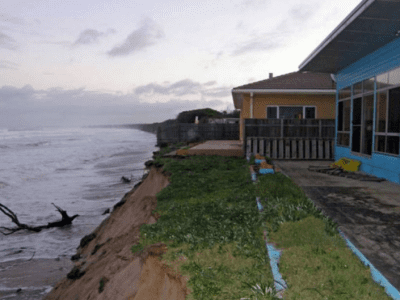INTEGRATED OR DISINTEGRATED COASTAL ZONE MANAGEMENT?

A lack of leadership and failed responses over many years has resulted in mis-management at Old Bar in NSW
Many have written about the relevance of ICZM to good coastal management both in Australia and overseas. Our ACS President, Geoff Wescott, has also noted how Australia was credited as an early leader in ICZM. There is no doubt that many of us see advantages in the concept and in its application to practical circumstances; who could object to the these elements of the definition of ICZM from the European Commission:
“ ICZM uses the informed participation and cooperation of all stakeholders to assess the societal goals in a given coastal area, and to take actions towards meeting these objectives. ICZM seeks, over the long term, to balance environmental, economic, social, cultural and recreational objectives, all within the limits set by natural dynamics…. It means integration of all relevant policy areas, sectors, and levels of administration”.
It is a concept well reviewed in the literature with all sorts of warnings about the difficulties in its application. In one of the best reference works on ICZM by Cicin-Sain and Knecht (1998) we are warned that “ the coastal manager must be realistic and avoid turning integrated coastal management into a kind of crusade”. And R. Bille in 2008 has written about the four entrenched illusions of ICZM (check out online reference 17 in Wikipedia article on ICZM published by SAPIENS).
I feel I am working in the world of disintegrated coastal zone management (DICZM). Obtaining goals as set out in the 2006 National Cooperative Approach is difficult due to resistance to both vertical integration across levels of government and horizontal integration within sectors and levels of administration. Is DICZM the dominant paradigm in Australia?
One driver for disintegration is the power of vested economic interests in driving outcomes that are seen as promoting both economic growth and jobs growth. These can be seen as the dominant political interests and are coupled with a range of short term indicators that also resonate with commerce and the media. Given the nature of political cycles in this country this is quite understandable. On the coast we see development forces active in pushing for approvals and removal of restrictions in order to achieve investment success and local job growth often at the expense of natural values. In a more integrated world such forces would be accommodated, but that requires regional strategic planning, negotiation, compromise, delays, and understanding of long-term consequences. Significant parts of the Australian coast is “”contested space”. We have many examples of how committed individuals and groups have fought short term economic interests such as sand mining for heavy minerals and won; but the battles have been ugly and I am not sure that they will not erupt in other places until we work “within the limits set by natural dynamics”.

Sydney’s beaches are at risk if no action is taken
to integrate approaches to coastal management
A second driver relates to the structure and operation of public administration in Australia. Our constitution limits federal powers hence the reference in the 2006 Plan to a national cooperative approach. All states and territories had to agree to cooperate in order for the plan to be implemented if the federal government was to invest in ICZM. But the Commonwealth Government decided NOT to invest. So where did that leave us? The states have their own legislation, policies and regulations (e.g. at that time NSW banned canal estates, other states did not). Local governments are creatures of the states with some councils more able to manage for the long term than others given legacies of past mismanagement or policies such as freeholding shack lands that were previously leased. And then there are issues of the operation of silos within government agencies and the level to which they cooperate. I have recently read of an English experience where cooperation between engineers and planners at the local level is still an issue for achieving integrated decision making. I think many of us are familiar with similar difficulties in different parts of Australia at state and local government levels.
Thirdly, I must comment on the need for champions to emerge in the political sphere who can drive what might be seen as integrated decisions. Unfortunately this is rare and those that do have the coast at heart do not usually last long enough to have a long-term impact. A Minister with coastal interests often wields other powers within Cabinet and hence can achieve good outcomes. A real problem exists when other portfolio interests such as mining backed by a politically powerful Minister, Premier or even Prime Minister, clash with protecting environmental or recreational values. This has been the case over many decades for the Great Barrier Reef and Fraser Island.

Tourism needs to be a driver for
sustainable coastal management
As an eternal optimist, I see signs that the ambitions of ICZM may not be as dead as we sometimes fear. There is a game changer lurking in the shadows. Extreme events, limits on finance and insurance, loss of coastal land and property values, rising sea levels, marine pest invasions, relocation costs of villages and infrastructure, higher coastal temperatures and accompanying heart stress and disease outbreaks, all may contribute to a higher level of governmental and industry cooperation given our continued desire to be near the coast. So will it be crisis driven integrated coastal management? Is our knowledge base growing sufficiently to trigger adaptive decision making that mitigates the impact of these looming problems? The Dutch have long ago found a way to think long term; we too are essentially a coastal national with growing coastal populations that should be demanding sustainable solutions. Perhaps the time will soon arise under a national champion to secure an implementable national cooperative approach to ICZM. Or am I dreaming?
– words by Prof. Bruce Thom

